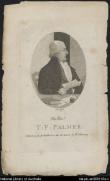A Unitarian minister and political reformer, Palmer studied at the University of Cambridge and was ordained a minister in 1771. In the 1783, he became disillusioned with the Church of England and became a Unitarian, associating with leading dissenting figures such as Joseph Priestley. Palmer was one of many liberal theologians of the late eighteenth century who made the leap from dissenting religion to political radicalism. While preaching to a dissenting congregation in Dundee, Scotland, during the French Revolution, Palmer became active in a local group calling for political reform. In 1793, he was convicted of sedition for publishing "An Address to the People" by George Mealmaker, a Dundee weaver, and sentenced to seven years transportation. He was transported to New South Wales on the Surprize in 1794, along with others of the so-called "Scottish Martyrs."
Along with the other early political prisoners, Palmer was allowed more liberty than most serving convicts, and was able to carry on private enterprise. About 1797, he formed a shipbuilding partnership with two free settlers who had come to New South Wales on the Surprize. Palmer was a friend of the surgeon and explorer George Bass, with whom he exchanged maritime information and knowledge, but a fierce critic of governor John Hunter. Some of Palmer's letters criticising Hunter's administration were published anonymously as broadsides in England, causing the Admiralty to query Hunter on his management of the colony.
After his sentence expired in 1801, Palmer and his shipbuilding partners purchased and refurbished a captured Spanish ship, El Plumier, and sailed for England. The ship proved unseaworthy, however, and Palmer and his associates were forced to land and abandon the ship at Guam. Palmer died there in 1802.
See related entry.
 4060440762732133168.jpg
4060440762732133168.jpg
 4060440762732133168.jpg
4060440762732133168.jpg